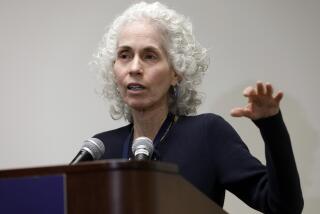Billing man to send him a bill shows need for class-action suits
- Share via
When it comes to healthcare costs, there’s what you may owe the hospital, what you may owe your doctor and what you may owe the drugstore.
Most patients would probably agree that paying an additional fee solely to receive your bill is a bit much.
Justin Nolte thought so. He filed a lawsuit against Cedars Sinai Medical Center in 2013 over a $167 charge tacked onto a bill for seeing a Beverly Hills doctor. He didn’t go to the hospital; the doctor’s billing simply was handled by Cedars.
The charge was for nothing more than “creating a patient account on the computer system,” according to the suit
Nolte’s lawyers petitioned the California Supreme Court this week to hear their appeal of a lower court ruling that upheld the fee.
There are a number of things going on here, not least the frustrating lack of transparency for healthcare charges and the absurdity of billing someone $167 just so you can send him a bill.
Nolte’s lawsuit had sought class-action status, meaning it would represent everyone billed by Cedars just for being billed. But before a decision was made on certifying the class, the trial court judge ruled that the charge was legitimate, and the state appeals court agreed.
Regardless of whether you agree with the rulings so far — and I don’t — they illustrate a class action at work.
A relatively minor grievance received its day in court, and a business was able to respond and receive a fair hearing. That’s a far cry from the corporate world’s familiar lament that class-action lawsuits exist solely to gouge big companies.
“This shows that firms that haven’t violated the law can, in fact, defend themselves,” said Christopher Leslie, a law professor at UC Irvine who focuses on class-action settlements.
Even though the ruling didn’t go Nolte’s way and even though a class was never formed, he said, “class actions are critical in situations where it’s not cost-effective for an individual to pursue an individual lawsuit.”
I wrote on Tuesday about a bill making its way through the Republican-controlled House that consumer advocates think would spell the end of class-action lawsuits.
The Fairness in Class Action Litigation Act — HR 1927 — was approved last week by the House Judiciary Committee. It would require that all members of a class action experience “the same type and scope” of harm as the main plaintiff in the case.
If that harm isn’t identical, apparently, you couldn’t join with others in pressing a case. Critics say this would “eviscerate” the class-action system.
The bill is supported by the U.S. Chamber of Commerce, the country’s largest business group. It’s opposed by dozens of consumer-related organizations, including the American Civil Liberties Union, the Consumer Federation of America and Public Citizen.
“Businesses hate class actions because, otherwise, they could continue getting away with mischarging for small amounts,” said William Rubenstein, a Harvard University law professor. “No one would ever sue them.”
In his petition to the state Supreme Court, Nolte argues that the appellate court erred when it ruled that he didn’t have a right to be informed in advance about “every individual charge” on his bill from Cedars.
Jeff Leon, one of the lawyers representing Nolte, told me that billing costs are part of a doctor’s or hospital’s routine overhead. No one would anticipate a fee of $167 just to be billed, he said. The fee was reduced to $78 after an insurance adjustment was applied.
“Mr. Nolte never went to Cedars at all,” Leon said. “Nevertheless, Cedars sent him a bill just for putting him in Cedars’ billing system.”
Sally Stewart, a Cedars spokeswoman, said the fee was for “the costs of providing services that do not involve physician care, including medical supplies and nursing services.”
Not so, responded Leon. “Mr. Nolte received no medical supplies and no nursing services,” he said.
The bill from Cedars lists the $167 charge as “New Patient, Level 2.” Leon said Cedars itself described the fee in court as one for “setting up the file and getting him in the system.”
I can’t say what the state Supreme Court will do. But the appellate court, and the trial court before it, ruled that when Nolte signed his name to a form agreeing to Cedars’ terms and conditions, he was implicitly accepting all “regular rates and terms of the hospital.”
I get it — let the buyer beware. Trouble is, it seems nuts to think anyone would anticipate a $167 fee, or even a $78 fee, just to be billed.
The healthcare market isn’t a free market. Consumers have no idea what anything really costs and typically are unable to shop around. They have to take what they get.
What’s needed are detailed, itemized bills, written in plain English, and a regulated system that allows for patients to challenge unreasonable expenses. I’d certainly place Cedars’ billing fee on that list.
Without such measures, class-action lawsuits are one of the few options available to seek redress.
“A person with a $167 claim, if it has merit, should be able to get their $167 back,” said Maureen Carroll, a law review fellow at UCLA School of Law.
It’s that simple.
David Lazarus’ column runs Tuesdays and Fridays. he also can be seen daily on KTLA-TV Channel 5 and followed Twitter @Davidlaz. Send your tips or feedback to [email protected].
More to Read
Inside the business of entertainment
The Wide Shot brings you news, analysis and insights on everything from streaming wars to production — and what it all means for the future.
You may occasionally receive promotional content from the Los Angeles Times.











